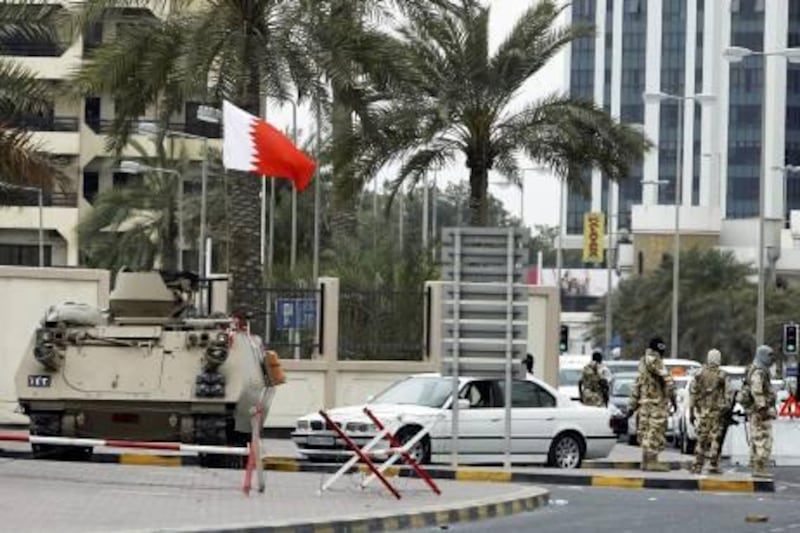MANAMA // The leader of Bahrain's main opposition group said last night that they would not begin a dialogue with the government on a path to reform until troops withdraw from the country's streets.
Sheikh Ali Salman, the head of Al Wefaq party, told a press gathering that peaceful protests would continue, despite a state of emergency still in place across the country.
"We won't go to talks over the bodies of our children," he said.
The government claims the emergency rule is aimed at restoring order and security after a month of unrest. The three-month emergency rule gives the military wide powers to suppress the pro-democracy uprising that began in mid-February.
Sheikh Khalifa bin Salman al Khalifa, the prime minister, said yesterday that the government was still committed to reform.
"The door is and will remain open for anyone keen on national reform for the reform project initiated by the king is a continuous process that will never stop," he said in a statement carried by the state news agency.
During a meeting of the Bahraini cabinet yesterday, the government stressed that "ongoing procedures are necessary and that checkpoints aim to ensure the safety and security".
Since emergency rule was imposed on the island on March 15, the opposition believe 100 people have gone missing. Two men previously listed as missing were yesterday confirmed to have died from wounds they received late last week, according to Al Wefaq. One woman, Bahia al Aradi, a nurse, was also pronounced brain-dead yesterday.
Sheikh Salman was speaking at a press gathering where seven Bahraini opposition groups announced key demands, including the immediate release of political prisoners, including Hassan Mushaima, the leader of the Haq movement, and Ebrahim Sharif of Waad, who were arrested on Wednesday. The government has described them as members of a "sedition ring".
The opposition also demanded an end to "the siege" on Salmaniya Hospital, which is now controlled by security forces, and appealed to the international community to ensure the safety of the Bahraini people.
"We ask our people to gather every night on his roof to say to the government that people are still demanding real democracy," said Sheikh Salman, referring to the nightly cries of Allah-uh-akhbar that can be heard coming from many villages.
"We won't ask them to go to the street … [But] this strategy may change if we see no other solution than to die in the street."
Amid growing concern about the violent tactics being used by security forces and fears for those still missing, late on Saturday night two men were seen being beaten and kicked by a group of a dozen, balaclava-clad soldiers and police in uniform.
It was not clear why the men were being held, but they were in violation of the curfew in place in the area. One policeman was seen taking a running start before kicking one of the men, who lay face down on the tarmac, in the middle of a major intersection in central Manama.
The men were blindfolded, their hands handcuffed and twisted behind their backs. Their feet were also bound, while the police searched their car. One of the men was later put in the back of a police truck, while the other was taken away in an unmarked car.
Yesterday, another village mourned as the funeral procession for Isa Radhi, a 46-year-old security guard, was held in Sitra, where thousands poured onto the streets.
Early yesterday, men gathered outside a mosque in the village, where Radhi's body lay, in a scene that has become all too familiar in the last month. Radhi is believed to have been killed during clashes on the island of Sitra on Tuesday. He suffered massive trauma to the head and was shot in his legs, according to his family.
Ibrahim Radhi, the dead man's younger brother, yesterday described him as a quiet and reserved man, who never married and was not actively involved in anti-government protests.
"Usually Isa is quiet and doesn't go out a lot. We are still not clear what happened, but I am sure he wasn't going to do anything but save our area from danger," said Mr Radhi, 35, who works in a bank. "My family feels upset, but we are also happy for him to go to his God and to a better life."
Also yesterday, a Kuwaiti medical delegation headed for Bahrain was refused entry at the Bahraini border and began to return home, a Kuwaiti government source said. The source did not know why the Bahraini authorities had refused entry to the convoy of 21 vehicles, including four ambulances, which had travelled by land through Saudi Arabia.
An official Bahraini source yesterday denied that the convoy had been banned and said the delegation would arrive tomorrow, the Bahrain News Agency reported.
A statement on Kuwait's state news agency, Kuna, earlier in the day, said that the convoy was sent to Bahrain in line with the instructions of the emir, Sheikh Sabah al Ahmed al Jaber al Sabah, "to aid the Gulf country and its brotherly people".
* James Calderwood reported from Kuwait City
jcalderwood@thenational.ae
zconstantine@thenational.ae





